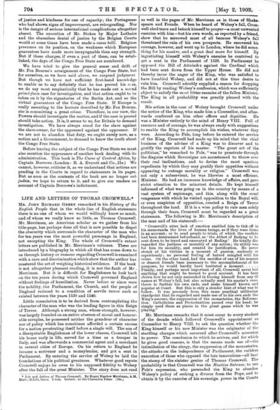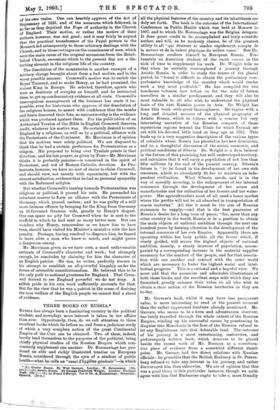LIFE AND LETTERS OF THOMAS CROMWELL.*
Ma. Josex RICHARD GREEN remarked in his History of the English People that in the whole line of English statesmen there is no one of whom we would willingly know so much, and of whom we really know so little, as Thomas Cromwell. Mr. Merriman, an American scholar as we gather from his title-page, has perhaps done all that is now possible to dispel the obscurity which surrounds the character of the man who for ten years was the most powerful personage in England, not excepting the King. The whole of Cromwell's extant letters are published in Mr. Merriman's volumes. These are introduced by a biography in which all that has come down to us through history or rumour regarding Cromwell is examined with a care and discrimination which show that the author has mastered the art of weighing historical evidence. If the book is not altogether pleasant reading, it is not the fault of Mr . Merriman. But it is difficult for Englishmen to look back on the ten years during which Cromwell governed England without feelings of humiliation. Never before or since were the nobility, the Parliament, the Church, and the people of England reduced to a condition of servile terror such as existed between the years 1530 and 1540.
Little consolation is to be derived from contemplating the character of the man who was the leading figure in this Reign of Terror. Although a strong man, whose strength, however, was largely founded on an entire absence of moral and honour- able scruples, he possessed neither the grandeur of character nor of policy which has sometimes afforded a certain excuse for a nation prostrating itself before a single will. The son of a disreputable Englishman of the lower classes, Cromwell left his home early in life, served for a time as a trooper in Italy, and was afterwards a commercial agent and a merchant in several cities of Europe. On his return to England he became a scrivener and a moneylender, and got a seat in Parliament. By entering the service of Wolsey he laid the foundations of his political greatness. Whatever good repute Cromwell enjoys be owes to his supposed fidelity to Wolsey after the fall of the great Minister. The story does not read
• Life and Letters of Thomas Cromwell. By Roger Bigelow Merriman, A.M. Harr., B.Litt. Oxon. 2 vols. Orford : at the Clarendon Press. pled
so well in the pages of Mr. Merriman as in those of Shalje- speare and Fronde. When he heard of Wolsey's fall, Cron}.
well shed tears and betook himself to prayer—a moat unwonted exercise with him—but his own words, as reported by a friend, show that he sorrowed most of all because Wolsey's fat)
threatened the ruin of his own prospects. He recovered his courage, however, and went up to London, where he did some- thing for his master, and a great deal more for himself. By ingratiating himself with Wolsey's enemies he contrived to get a seat in the Parliament of 1529. In Parliament he opposed the Bill of Attainder against the Cardinal which had been sent down from the Upper House. He did not thereby incur the anger of the King, who was satisfied to have humbled Wolsey, and did not at this time desire to ruin him. Cromwell adroitly supplied a reason for dropping the Bill by reading Wolsey's confession, which was sufficiently abject to satisfy the most bitter enemies of the fallen Minister.
The King in all probability was greatly pleased with the result.
His action in the case of Wolsey brought Cromwell under the notice of the King, who made him a Counsellor, and after. wards conferred on him other offices and dignities. He was a Minister entirely to the mind of Henry VIII. Full of resource and of courage, he was always ready with suggestions to enable the King to accomplish his wishes, whatever they were. According to Pole, long before he entered the service
of the King, Cromwell had made up his mind that the chief business of the adviser of a King was to discover and to
gratify the caprices of his master. " The great art of the politician," he remarked to Pole, "was to penetrate through the disguise which Sovereigns are accustomed to throw over their real inclinations, and to devise the most specious expedients by which they may gratify their appetites without
appearing to outrage morality or religion." Cromwell was not only a subservient, he was likewise a most efficient,
Minister. He had an immense knowledge of affairs, and gave strict attention to the minutest details. He kept himself informed of what was going on in the country by means of a vast system of espionage, and this, along with the cruel vengeance with which he visited opposition to the Royal will, or even suspicion of opposition, created a Reign of Terror throughout the land. If it is a wise policy to rule men solely through their fears, Cromwell must be regarded as a great statesman. The following is Mr. Merriman's description of the man and of his statecraft :— " Cromwell's utter lack of emotion enabled him to tick off in his memoranda the lives of human beings, as if they were items in an account; or to send people to trials, of which the verdicts had been determined beforehand, as the Abbot of Redyng to be sent down to be tryed and excecutyd at Reding.' He totally dis- regarded the justness or morality of any action ; its utility was for him its morality, and created its justification. He never struck at his victims in a moment of passion, uselessly or capriciously ; no personal feeling of hatred mingled with his crime. On the other hand, had the sacrifice of one of his nearest or dearest friends been necessary to the accomplishment of his purposes, he would hardly have hesitated a moment Finally, and perhaps most important of all, Cromwell never lost anything that might be turned to good account. It has been shown how he not only succeeded in freeing himself from any ill names at Wolsey's fall, but also actually used his master's over- throw to further his own ends, and make himself known and popular at Court. But this is only a slender hint of what was to follow. It was precisely from this same practical utilitarian standpoint that he regarded and made use of to his own ends the King's amours, the suppression of the monasteries, the Reforma- tion. Catholicism and Protestantism passed over his head; he simply used them as pieces in the great game which he was Playing."
Mr. Merriman remarks that it must occur to every student of the decade which followed Cromwell's appointment as Counsellor to Henry VIII. to ask the question whether the
King himself or his new Minister was the originator of the startling changes which occurred after Cromwell's accession to power. The conclusion to which he arrives, and for which he gives good reasons, is that the means made use of—the intimidation of the clergy, the suppression of the monasteries, the attacks on the independence of Parliament, the ruthless execution of those who opposed the late innovations—all bear the stamp of the sinister genius of Thomas Cromwell. The
probability is that Cromwell was the Nuntius Salanae, to use Pole's expression, who persuaded the King to abandon Wolsey's policy of seeking a divorce from the Pope, and to
obtain it by the exercise of his sovereign power in the Courts
of his own realm. One can heartily approve of the Act of Supremacy of 1535, and of the measures which followed, in so far as they deprived the Pope of authority in the Church of England. Their motive, or rather the motive of their authors, however, was not good ; and it may fairly be argued that the practical transference of the Papal powers to the Monarch led subsequently to those arbitrary dealings with the Church, and to those outrages on the consciences of men, which were the main cause of the original secessions from the Estab- lished Church, secessions which to the present day are a dis- turbing element in the religious life of the country.
The dissolution of the monasteries is another example of a salutary change brought about from a bad motive, and in the worst possible manner. Cromwell's motive was to enrich the Royal Treasury, and to make Henry, as he had promised, the richest King in Europe. He selected, therefore, agents who were as destitute of scruples as himself, and be instructod them to get up condemnatory evidence at all costs. Cromwell's unscrupulous management of the business has made it im- possible, even for historians who approve of the dissolution of the religious houses, to assert with confidence that the monks and friars deserved their fate, so untrustworthy is the evidence which was produced against them. For the publication of an Authorised Version of the Bible in English Cromwell deserves credit, whatever his motive was. He certainly desired to unite England by a religious, as well as by a political, alliance with the Protestants of the Continent. Mr. Merriman is of opinion that his motives were solely political. We are disposed to think that he had a certain preference for Protestantism as a religion. His proposal to bring over Tyndale points in that direction ; and his last prayer, as given by Foxe—Mr. Merriman thinks it is probably genuine—is conceived in the spirit of Protestant, and not of Roman Catholic, devotion. As Pro- testants, however, we have no sort of desire to claim Cromwell, and should view, not merely with equanimity, but with the utmost satisfaction, evidence that he had no personal sympathy with the Reformed religion.
But whether Cromwell's leaning towards Protestantism was religious or political, it proved his ruin. He persuaded his reluctant master to form an alliance with the Protestants of Germany, which proved useless ; and he was guilty of a still more heinous offence by bringing for the King from Germany an ill-favoured German wife, greatly to Henry's disgust. One can spare no pity for Cromwell when be is sent to the scaffold to which he had sent so many better men. But one wonders why Henry, remorseless as we know him to have been, should have visited his Minister's mistakes with the last penalty. Perhaps, having resolved to disgrace him, he feared to leave alive a man who knew so much, and might prove a dangerous enemy.
Mr. Merriman gives, as we have seen, a most unfavourable estimate of Cromwell's character and work ; but strangely enough, he concludes by claiming for him the character of an English patriot. He was, he writes, perfectly sincere in his attempt to establish an all-powerful kingship under the forms of ostensible constitutionalism. He believed this to be the only path to national greatness for England. That Crom- well desired to see England powerful we do not deny. A selfish pride in his own work sufficiently accounts for that. But for the view that be was a patriot in the sense of desiring the true welfare of the English people we cannot find a shred of evidence.











































 Previous page
Previous page